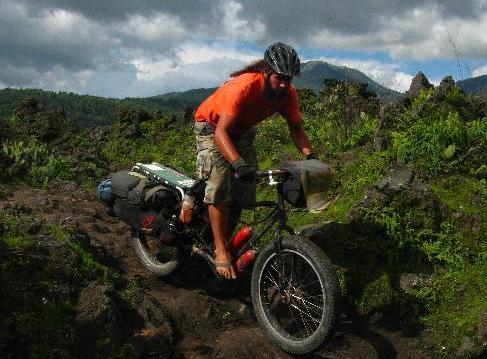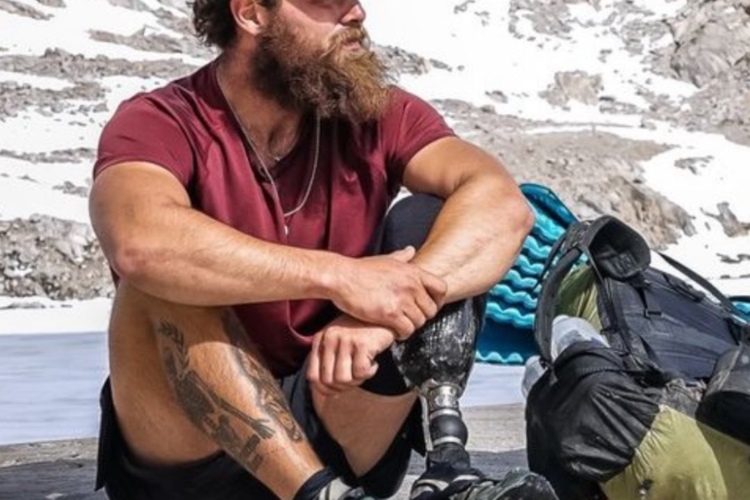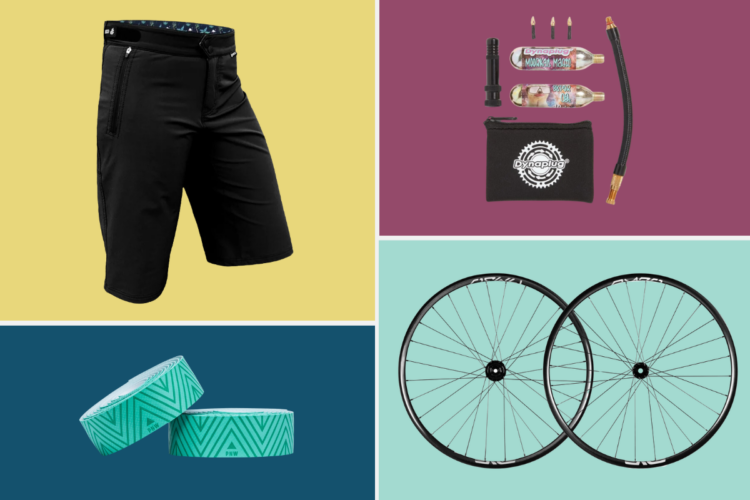
It was the middle of the afternoon by the time Matteo and I left Huehuetenango, Guatemala, riding south on the Pan-American Highway. We’d been riding together for a week or two. We met in Oaxaca, a city in southern Mexico, and again in San Cristobal de las Casas, both of us making our way south by bicycle. We’d make it to Patagonia in a few months, we hoped, in time to catch the tail end of the South American summer. That was the plan. But progress was slow-going.
We were sick and tired and sluggish. I was coming down with some kind of flu, and Matteo had it worse than I did. He’d been diagnosed with salmonella and typhoid and some mysterious stomach parasite back in San Cris, where he’d been laid up for the better part of a month. By the time I rolled into town, he was beginning to recover and ready to get back on his bike. But he was still feeling off. On top of that, it was the middle of June, and the Central American rainy season was well underway. We’d been getting drenched nearly everyday since crossing the border into Guatemala. Had we been on the coast, the rain would have been a welcome respite from the heat. In the highlands of northern Guatemala, more than a mile above the sea, it was bitterly cold.
The Pan-American Highway is choatic, always busy with traffic. The stretch of pavement on which Matteo and I rode, lined to our right by a mountainside forested by Guatemalan fir and Mexican elm and Central American walnut, and to our left by expansive views of distant peaks and valleys shrouded in mist, is just one segment of the road network that stretches some 19,000 miles from Prudhoe Bay, Alaska to Ushuaia, Argentina. El fin del mundo. The end of the world. It’s as far south as you can travel overland in the Americas, the southernmost city in the world. It’s a part of the allure of a trip like this, a worthy destination; part of the reason why folks like Matteo and I travel the path. Some travel the path in Sprinter vans decked out with roof racks full of adventure gear, apartments on wheels. Some travel it on motorcycles. Some, like Matteo and I, travel the path on bicycles. We met one woman who, believe it or not, was traveling the route on foot.
I don’t know if there was a speed limit on that stretch of the Pan-Am, south of Huehuetenango, but there didn’t seem to be. Most worrisome were the semi-trucks. We’d seen the drivers of these big rigs in roadside tiendas since we’d been on the highway, two dozen empty beer bottles scattered across the table in front of them. “Amigos,” one of them said. He lifted a key to his nose, probably the key to his truck, and snorted an imaginary powder. “No, gracias,” we said. That scene played and replayed in my mind, every time I heard one of the trucks approaching from behind and accelerating, the engine roaring like some mythical beast before breezing past me like a train and hauling ass around the next bend in the road, looking liable to tip over. Some did. Just the day before we’d seen a semi lying on its side by the side of the road, rotting fruits and vegetables scattered about the ditch. The road had no shoulder, and sometimes, the trucks would pass just inches from our handlebars, going God-only-knows how fast.
The drivers of the camper vans and pickup trucks and sedans and motorcycles were only a little more courteous.
It started to rain, as it tended to do in the late afternoon. I pulled off the road onto a stretch of gravel and pulled on my rain parka. Matteo had gifted it to me back in San Cristobal, and another cyclist had gifted it to him a few weeks earlier. “I’m probably going to regret this,” Matteo had said as he handed me the parka.
Matteo rode on ahead of me, shirtless and without a helmet, his long brown hair wet and slicked to his shoulders by the rain. He wore baggy black mountain bike shorts, the kind you might see riders sporting while hitting jumps and drops at the bike park. His arms are covered in tattoos, but I couldn’t see them as he climbed on up the slope and disappeared over a distant hill. He has an almost supernatural ability to attack climbs without slowing his cadence or shifting gears. I usually found him waiting for me at the top of the climb.
The rain fell harder. The air grew colder and cloudier. I began to shiver. I felt weak. I could only crawl up the mountain at a pathetic pace, and I felt like I was going to retch up my breakfast of huevos rancheros any second now. My phone was dead too, and I didn’t know how many miles remained between us and our tentative destination of Quetzaltenango.
One mile at a time, I thought.

. . .
“What happened to you?” Matteo asked, an hour or two later, as I stepped into a little roadside tienda made of plywood and sheet metal, against which rain drummed in a cacophony so loud I could hardly hear him speak.
“I feel like shit,” I said. I sat down and dressed in all my layers—rain pants, down jacket, rain jacket, poncho. Still I couldn’t warm up, couldn’t stop shivering.
“I was getting worried,” Matteo said. “I thought something happened to you, dude.”
“Like what?”
“I don’t know, like you got hit by a car or something.”
“Not today,” I said with a laugh. “Those semis though…” I shook my head.
“We’ll be off the highway soon,” Matteo said. We were getting close to Lake Atitlan, a popular and stunningly beautiful tourist destination where we planned on resting up for a few days, but as far as I was concerned, we weren’t getting close enough. He looked down at the empty plate in front of him, smeared with what remained of his rice and eggs and refried beans. “I already ate,” he said.
I had no appetite—all my stomach seemed to tolerate was Haribo gummy bears—but I ordered some food anyway. A few semi-truck drivers walked in and sized us up and figured those must be our bikes out front. We must have looked like a pretty sorry lot, because the men bought us each a cup of coffee, and the woman running the tienda brought us two cups of hot chocolate, free of charge. We paid her anyway. We sat and sipped our chocolate caliente and waited for the storm to pass.

. . .
The storm never did pass. It was getting dark, and we needed to find a place to pitch our tents for the night. We looked for a hotel on our apps—iOverlander and Google Maps—but the nearest was in Quetzaltenango, nearly 30 miles away. We wouldn’t make it that far by sundown. The sun already was down. We looked for a local bomberos, a fire station, on our maps. We’d spent a few nights in a few fire stations in the preceding weeks, and found them to be a reliable last-ditch resort to escape a night of camping in the rain. The firefighters always welcomed us; they never turned us away. But there were no bomberos to be found. It was dark now. We’d be riding by headlamp; a good way to get yourself killed on the Pan-Am Highway, I thought.

“Discuple,” Matteo said to the woman running the tienda. Excuse me. He spoke better Spanish than I did, and he did most of the talking. He asked her if there was anywhere nearby where a couple of weary travelers could spend the night. I’m paraphrasing. The woman made some phone calls, and she connected us with the local pastor, who said we could sleep in the warehouse of the local church. Beggars can’t be choosers.
The church was a few miles down the road. We rode the final miles in the rain, the pavement smooth and slick and illuminated by headlights that flashed and faded away in the darkness. We kept our headlamps on pulse mode, hoping the strobing lights would alert drivers to our presence and deter them from running us over. Sometimes narrowly, they did.
We pulled off onto a road to the right of the highway and climbed a final hill to the town church, where the Father greeted us and unlocked the doors to the warehouse, just across the street from the church, and let us inside. The warehouse was a long and narrow building with a floor made of concrete and a roof made of sheet metal. It looked like an empty gymnasium. A few dim light bulbs hung from the ceiling beams, and jumbled heaps of old school desks and tables and chairs were piled against one wall, stacked from the floor to the roof.
We thanked the Father excessively. He wished us a good night and asked us to lock the doors up behind us when we left in the morning. Then he left us. We pitched our tents on the concrete, so as to keep the mosquitos and rodents from feasting on us in our sleep. We tossed our gear into our tents and grabbed a couple chairs and a table and made a little dining room for ourselves. The scene looked like the set of a play, a low-budget production. I ate a bag of gummy worms and boiled some water with my camp stove and made some tea. We were pale and cold, and dark bags lined our eyes in semi-circles. We looked something like sailors suffering from scurvy.
“My stomach is killing me,” Matteo said. He rose and walked to the corner and lined a small trash bin with a plastic bag, a few of which we kept on hand for desperate times like these. You never know when you might need one. Tucked under his arm was a roll of toilet paper.
I turned my chair around and put my headphones in and cranked up the volume, thinking of better days.
It was a miserable day, but it was beautiful in a way. It was a reminder that most people are good and decent human beings who are happy to help a human being in need. It was a reminder that most days, at the end of the day, things tend to work out alright. It was a reminder that one of the few things that are certain in life is that the future is uncertain. That day, as dismal and trying as it was, taught me a lesson in making peace with uncertainty.



















